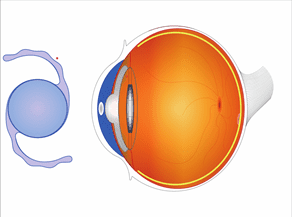
What are Refractive Errors?
Relying on corrective eyewear throughout your life can be cumbersome. This aggravation often worsens after you turn 40 and require reading glasses due to presbyopia on top of your other refractive errors. Refractive errors occur when the cornea (clear dome at the front of your eye) and natural eye lens fail to bend light correctly onto the retina. The retina is the light-sensitive tissue found at the back of your eye that sends messages to your brain to turn the light into images.
When the cornea is misshapen, this causes a refractive error and blurry vision at one or more focal distances, such as nearsightedness (myopia), farsightedness (hyperopia) and astigmatism. When the eye’s natural lens hardens as you get older, it can no longer accommodate changing distances, making it difficult to focus on objects nearby. Lens hardening is a natural part of aging, causing a refractive error called presbyopia, and is why you require reading glasses.
The Benefits of Clear Lens Exchange
PRK and LASIK can correct the curvature of your cornea, but you will still need reading glasses due to age-related presbyopia. Depending on the type of artificial lens implant you choose, such as AcrySof IQ PanOptix Trifocal IOL, clear lens exchange can correct all refractive errors.
The benefits of replacing the eye’s natural lens with an IOL include:
- Correcting high degrees of nearsightedness and farsightedness that do not qualify for laser vision correction or phakic IOLs (implanted contact lenses placed in front of the natural lens)
- Eliminating the risk of developing cataracts as you get older because the natural lens is removed already
- Significantly reducing or eliminating the need for prescription eyeglasses, contact lenses and/or reading glasses
- Risking fewer complications than laser vision correction because clear lens exchange doesn’t impact corneal thickness
- Offering a fast recovery
Who Is a Candidate for Clear Lens Exchange?

You need to be in good overall health with no medical conditions that complicate healing. Our ophthalmologist, M. Farooq Ashraf, will check for signs of eye disease and ensure you have healthy eyes before discussing your vision correction options.
Intraocular Lens Implant Options
Intraocular lens implants are small, synthetic lenses that replace the natural eye lens during clear lens exchange or cataract surgery. IOLs correct refractive errors for clear vision and have various focusing powers, just like your prescription eyeglasses and contact lenses. Dr. Ashraf will measure the curvature of your corneas and your eyes’ length to determine the appropriate IOL focusing power.
IOLs are typically made of a plastic composition, such as silicone or acrylic. These synthetic lenses are coated to protect your eyes from harmful UV light. Several IOL types offer crisp vision at one or more focal distances, including:
Monofocal IOLs
These lenses are typically used during cataract surgery and are set for a single refractive error, typically improving distance vision. You will still need reading glasses with monofocal IOLs.
Multifocal IOLs
These premium IOL options provide better eyesight for distant and nearby objects. The lenses use different zones and lens powers and may improve presbyopia, but it’s likely you’ll still need reading glasses. FDA-approved multifocal IOLs include AcrySof IQ ReSTOR and Tecnis Multifocal IOL.
Accommodative IOLs
These premium lenses move more like your natural lens (similar to a camera lens), allowing you to focus on objects at different distances. Accommodative IOLs treat presbyopia, and FDA-approved options include Crystalens and Trulign Toric.
Toric IOLs
Toric artificial lenses treat astigmatism specifically because this refractive error causes mismatched and steep curves on the cornea. Most IOL types come with a toric version, similar to contact lenses.
Trifocal IOLs
AcrySof IQ PanOptix is the only FDA-approved trifocal IOL, and this choice features the broadest range of vision improvement with a high chance you will not need glasses or contact lenses. This is the preferred lens for our LaserOPtix™ procedure, which uses a femtosecond laser to perform the incisions and corrections instead of the traditional handheld blade technique. The combination of PanOptix with LaserOptix™ offers enhanced, predictable results for improved patient safety and precision.
Learn More About Clear Lens Exchange
If you’re interested in clear lens exchange with intraocular lens implants, contact Atlanta Vision Institute today to schedule your consultation with Dr. Ashraf.

Please Take Our LASIK or Cataract Surgery Quiz
Take our vision quiz to find out if you qualify for LASIK or cataract surgery!


